- Home
- James Clavell
Whirlwind Page 18
Whirlwind Read online
Page 18
“I’ll take that,” his wife said and laughed at his look. She was tall and red-haired and wore elegant green that matched her eyes. “After all I’m half French.”
“A quarter—your grandmother was Norman, quelle horreur, and sh—” An enormous cheer that was echoed in the room drowned his pleasantry as the Scottish scrum half grabbed the ball from the scrimmage, threw it to a wing half who threw it to another who broke loose of the pack, smashed two enemy out of his way, and hurtled for the goal line fifty yards away, weaving, brilliantly changing direction to rash onward again, then stumble but somehow stay upright, then charge in a last, chest-heaving glorious run to dive over the line—to be buried at once by bodies and thunderous applause. Touchdown! 17 to 15 now. A successful goal kick will make it 17 all. “Scotland foreverrrr…”
The door opened and a manservant stood there. At once Gavallan got up, achingly watched the kick that was good and breathed again. “Double or nothing, Maureen?” he asked over the pandemonium, grinning at her as he hurried off.
“Taken!” she called out after him.
She’s down twenty quid, he thought, very pleased with himself, and crossed the corridor of the big, rambling old house that was well furnished with old leather and good paintings and fine antiques, many of them from Asia, and went into his study opposite. In it, his chauffeur, also gun bearer and trusty, who had been dialing McIver in Tehran for three hours and monitoring his incoming calls, held up one of the two phones. “Sorry to interrupt, sir, th—”
“You got him, Williams? Great—score’s seventeen all.”
“No, sir, sorry, circuits’re still busy—but I thought this one was important enough—Sir Ian Dunross.”
Gavallan’s disappointment vanished. He took the phone. Williams went out and closed the door. “Ian, how wonderful to hear from you—this is a pleasant surprise.”
“Hello, Andy, can you speak up, I’m phoning from Shanghai?”
“I thought you were in Japan; I can hear you very well. How’s it going?”
“Grand. Better than I expected. Listen, have to be quick but I heard a buzz, two in fact, the first that the taipan needs some financial success to get himself and Struan’s out of the hole this year. What about Iran?”
“Everyone advises that it will cool down, Ian. Mac’s got things under control, as much as possible; we’ve been promised all of Guerney’s contracts so we should be able to more than keep our end up, even double our profits, presuming there’s no Act of God.”
“Perhaps you should presume there might be.”
Gavallan’s bonhomie vanished. Time and again his old friend had privately given him a warning or information that had later proved to be astonishingly correct—he never knew where Dunross obtained the information, or from whom, but he was rarely wrong. “I’ll do that right away.”
“Next, I’ve just heard that a secret, very high-level—even perhaps cabinet level—shuffle has been ordered, financial as well as management, for Imperial Air. Will that affect you?”
Gavallan hesitated. Imperial Air owned Imperial Helicopters, his main competition in the North Sea. “I don’t know, Ian. In my opinion they squander taxpayers’ money; they could certainly use reorganization—we beat them hands down in every area I can think of, safety, tenders, equipment—I’ve ordered six X63s by the way.”
“Does the taipan know?”
“The news almost broke his sphincter.” Gavallan heard the laugh, and for a moment he was back in Hong Kong in the old days when Dunross was taipan and life was hairy but wildly exciting, when Kathy was Kathy and not sick. Joss, he thought, and again concentrated. “Anything to do with Imperial’s important—I’ll check at once. Other business news from here is very good—new contracts with ExTex—I was going to announce them at the next board meeting. Struan’s isn’t in danger, is it?”
Again the laugh. “The Noble House is always in danger, laddie! Just wanted to advise you—got to go—give my love to Maureen.”
“And to Penelope. When do I see you?”
“Soon. I’ll call when I can; give my best to Mac when you see him, bye.”
Lost in thought, Gavallan sat on the edge of his fine desk. His friend always said “soon” and that could mean a month or a year, even two years. It’s over two years since I last caught up with him, he thought. Pity he’s not taipan still—damn shame he retired, but then we all have to move on and move over sometime. “I’ve had it, Andy,” Dunross had said, “Struan’s is in cracking good shape, the ’70s promise to be a fantastic era for expansion and…well, now there’s no excitement anymore.” That was in ’70, just after his hated main rival, Quillan Gornt, taipan of Rothwell-Gornt, had drowned in a boating accident off Sha Tin in Hong Kong’s New Territories.
Imperial Air? Gavallan glanced at his watch, reached for the phone, but stopped at the discreet knock. Maureen stuck her head in, beamed when she saw he wasn’t on the phone. “I won—twenty-one to seventeen—busy?”
“No, come in, darling.”
“Can’t, have to check dinner’s ready. In ten minutes? You can pay me now if you like!”
He laughed, caught her in his arms, and gave her a hug. “After dinner! You’re a smashing bird, Mrs. Gavallan.”
“Good, don’t forget.” She was comfortable in his arms. “Everything all right with Mac?”
“It was Ian—he just called to say hello. From Shanghai.”
“Now there’s a lovely man too. When do we see him?”
“Soon.”
Again she laughed with him, dancing eyes and creamy skin. They had first met seven years ago at Castle Avisyard where the then taipan, David MacStruan, was giving a Hogmanay Ball. She was twenty-eight, just divorced, and childless. Her smile had blown the cobwebs from his head and Scot had whispered, “Dad, if you don’t drag that one off to the altar, you’re crazy.” His daughter Melinda had said the same. And so, somehow, three years ago it had happened, and every day since then a happy day.
“Ten minutes, Andy? You’re sure?”
“Yes, just have to make one call.” Gavallan saw her frown and added quickly, “Promise. Just one and then Williams can monitor the calls.”
She gave him a quick kiss and left. He dialed. “Good evening, is Sir Percy free—this is Andrew Gavallan.” Sir Percy Smedley-Taylor, director of Struan’s Holdings, an MP, and slated as the probable minister for defence if the Conservatives won the next election.
“Hello, Andy, nice to hear from you—if it’s about the shoot next Saturday, I’m on. Sorry not to have told you before but things have been rather busy with the so-called government shoving the country up the creek, and the poor bloody unions as well, if they only knew it.”
“I quite agree. Am I disturbing you?”
“No, you just caught me—I’m off to the House for another late-night vote. The stupid twits want us out of NATO, amongst other things. How did the X63 test out?”
“Wonderful! Better than they claimed. She’s the best in the world!”
“I’d love a ride in her if you could fix it. What can I do for you?”
“I heard a buzz that there’s a secret, high-level reorganization of Imperial Air going on. Have you heard anything?”
“My God, old man, your contacts are bloody good—I only heard the rumor myself this afternoon, whispered in absolute secrecy by an unimpeachable Opposition source. Damn curious! Didn’t mean much to me at the time—wonder what they’re up to. Have you anything concrete to go on?”
“No. Just the rumor.”
“I’ll check. I wonder… I wonder if the burks might be positioning Imperial to formally nationalize it, therefore Imp Helicopters, therefore you and all the North Sea?”
“God Almighty!” Gavallan’s worry increased. This thought had not occurred to him. “Could they do that if they wanted?”
“Yes. Simple as that.”
SUNDAY
February 11
OUTSIDE BANDAR DELAM: 6:55 A.M. It was just after dawn and Rudi had landed
away from the culvert and now the four of them were standing on the lip. The early sun was good, and so far no problems. Oil still poured out of the pipe but it was no longer under pressure. “It’s just what’s left in the line,” Kyabi said. “It should stop entirely in an hour.” He was a strong-faced man in his fifties, clean-shaven with glasses, and he wore used khakis and a hard hat. Angrily he looked around. The earth was soaked with oil and the fumes almost overpowering. “This whole area’s lethal.” He led the way to the overturned car. Three bodies were twisted in or near the wreckage and already beginning to smell.
“Amateurs?” Rudi said, waving away the flies. “Premature explosion?”
Kyabi did not answer. He went below into the culvert. It was hard to breathe but he searched the area carefully, then climbed back onto the road. “I’d say you were right, Rudi.” He glanced at Hussain, his face set. “Yours?”
The mullah took his eyes off the car. “It is not the Imam’s orders to sabotage pipelines. This is the work of enemies of Islam.”
“There are many enemies of Islam who claim to be Followers of the Prophet, who have taken his words and twisted them,” Kyabi said bitterly, “betraying him and betraying Islam.”
“I agree, and God will seek them out and punish them. When Iran is ruled according to Islamic law we will seek them out and punish them for Him.” Hussain’s dark eyes were equally hard. “What can you do about the oil spill?”
It had taken them two hours backtracking to find the break. They had circled at a few hundred feet, appalled at the extent of the spill that had inundated the small river and its marshlands and carried by the current was already some miles downstream. A thick black scum covered the surface from bank to bank. So far only one village was in its path. A few miles south there were many others. The river supplied drinking water, washing water, and was the latrine.
“Burn it off. As soon as possible.” Kyabi glanced at his engineer. “Eh?”
“Yes, yes, of course. But what about the village, Excellency?” The engineer was a nervous, middle-aged Iranian who watched the mullah uneasily.
“Evacuate the villagers—tell them to leave until it’s safe.”
“And if the village catches fire?” Rudi asked.
“It catches fire. The Will of God.”
“Yes,” Hussain said. “How will you burn it off?”
“One match would do most of it. Of course you’d burn up too.” Kyabi thought a moment. “Rudi, you’ve your Very pistol aboard?”
“Yes.” Rudi had insisted on taking the pistol, saying it was essential equipment in case of an emergency. All the pilots had backed him though all knew it was not essential. “With four signal flares. Do yo—”
They all looked into the sky at the scream of approaching jets. Two fighters, low and very fast, slashed over the terrain heading out into the Gulf. Rudi judged their path as leading directly to Kharg. They were attack fighters and he had seen the air-to-ground missiles in their racks. Are the missiles for Kharg Island? he asked himself, a new tightness in his throat. Has the revolution hit there too? Or is it just a routine flight?
“What do you think, Rudi? Kharg?” Kyabi asked.
“Kharg’s that way, Boss,” Rudi said, not wanting to be involved. “If so it’d be a routine flight. We’d have dozens of takeoffs and landings a day when we were there. You want to use flares to set the fire?”
Kyabi hardly heard him. His clothes were stained with sweat, his desert boots black with the oil ooze. He was thinking about the air force revolt at Doshan Tappeh. If those two pilots are also in revolt and attack Kharg and sabotage our facilities there, he thought, almost choked with rage and frustration, Iran will go back twenty years.
When Rudi had come to collect him early this morning, Kyabi had been astonished to see the mullah. He had demanded an explanation. When the mullah angrily said that Kyabi should close down all facilities and declare for Khomeini at once, he was almost speechless. “But that’s revolution. That means civil war!”
Hussain had said, “It is the Will of God. You’re Iranian, not a foreign lackey. The Imam has ordered confrontation with the armed forces to subdue them. With God’s help, the first true Islamic republic on earth since the days of the Prophet, the Blessings of God be upon him, begins in a few days.”
Kyabi had wanted to say what he had said privately many times: “It’s a madman’s dream, and your Khomeini’s an evil, senile old man, driven by a personal vendetta against the Pahlavis—Reza Shah whose police he believes murdered his father, and Mohammed Shah whose SAVAK he believes murdered his son in Iraq a few years ago; he’s nothing but a narrow-minded fanatic who wants to put us, the people, and particularly women, back into the Dark Ages…”
But he had said none of this today to this mullah. Instead, he put his mind back onto the problem of the village. “If the village catches fire, they can easily rebuild it. Their possessions are the important things.” He hid his hatred. “You can help, if you want, Excellency. I would appreciate your help. You can talk to them.”
The villagers refused to go. For the third time Kyabi explained that fire was the only way to save their water and to save the other villages. Then Hussain talked to them, but still they would not go. By now it was time for the midday prayer and the mullah led them in prayer and again told them to leave the banks of the river. The elders consulted with one another and said, “It is the Will of God. We will not leave.”
“It is the Will of God,” Hussain agreed. He turned on his heel and led the way back to the helicopter.
Once more they landed near the culvert. Now oil just seeped out of the pipe, no more than a trickle. “Rudi,” Kyabi said, “go upwind, far as you can, and put a flare into the culvert. Then put one smack in the middle of the stream. Can you do that?”
“I can try. I’ve never fired a Very pistol before.” Rudi plodded out into the scrub desert. The others went back to the chopper which he had parked safely away. When he was in position he put the large cartridge into the pistol, aimed, and pulled the trigger. The gun kicked, more than he expected. The burning phosphorus signal flare arced low over the ground, bounced as it came down short, then skipped into the air again and fell into the culvert. For a moment nothing happened, then the earth exploded and fire gushed upward and outward, making the overturned car into a funeral pyre. The superheated shock wave enveloped him but passed by safely. Acrid black smoke billowed skyward. Fire began spreading, racing toward the stream.
The second red flare arced high and then went into the river. The river caught fire. They knew it more from the sound than sight, but when they were airborne once more, skirting the river upwind, they saw the fire spreading rapidly downstream. Vast clouds of black smoke marked its path. Near the village they circled. Men, women, and children were fleeing with what they could carry. As they watched, the village was consumed.
The four men flew home.
Home for Kyabi was the area HQ of IranOil just outside Ahwaz, a neat complex of white concrete buildings with well-watered lawns and a helipad, enclosed by a tall fence.
“Thanks, Rudi,” he said, sick at heart. Around the chopper was a ring of armed men who had rushed out of hiding the moment they had landed, shouting and pointing their guns. Behind Kyabi the mullah toyed with his string of prayer beads.
Kyabi unbuckled his seat belt. The Will of God, he thought. I’ve done what I could, prayed correctly, and know that there is no other God but God and Mohammed is the Prophet of God. When I die I will die cursing the enemies of God, chief among them, Khomeini, False Prophet, murderer, and all those who follow him.
He turned around. His engineer was gray-faced and rigid in his seat beside Hussain. “Mullah, I commend you to God’s vengeance.” Kyabi got out.
They shot Kyabi and dragged the engineer away. Then, because the mullah asked it, they allowed the chopper to leave.
AT KOWISS AIR BASE: 5:09 P.M. Manuela was hurrying across the S-G compound toward the one-story office building that was tidy un
der the afternoon sun, the radio tower jutting above as a second floor. She wore flight overalls with the S-G emblem on the back and her auburn hair was bundled into a long peaked flight cap, but her walk shouted her femininity.
In the outer office were three of their Iranian staff. Politely they got up and smiled, watching her under heavy-lidded eyes.
“Good afternoon, Excellency Pavoud,” she said in Farsi with a smile. “Captain Ayre wanted to see me?”
“Yes, Madam Lady. His Excellency’s in the tower,” the chief clerk replied. “May I have the honor of escorting you?” She declined with thanks, and when she had gone along the corridor and up the spiral staircase, Pavoud said contemptuously, “Scandalous the way she flaunts herself at us—she does it just to taunt us.”
“Worse than a public woman from the Old Quarter, Excellency,” another said, equally disgusted. “By God, of all Infidels, Americans are the worst and their women the worst. And that one, that one’s asking, that one’s begging for trouble…”
“She’s begging for a good Iranian cock,” a small man said, scratching himself.
Pavoud said, “She should wear a chador and cover herself and walk modestly. We are all men here. We’ve all sired children. Does she think we’re eunuchs?”
“She should be whipped for taunting us.”
Pavoud picked his nose delicately. “With God’s help, soon she will be—publicly. Everyone will be subject to Islamic law, and punishments.”
“They say that American women have no pubics.”
“No, it’s just that they shave those parts.”
“Pubics or no, Excellency Chief Clerk, I’d like to thrust it into her, until she squealed—with joy,” the small man said, and they laughed together.
“That great oaf of her husband has every night since she’s been here.” The chief clerk’s eyes glittered. “I’ve heard them moaning in the night.” He lit a cigarette from the butt of the last, then got up and looked out of the window. He wore glasses and peered into the sky until he saw the distant chopper turn on to final. Death to all foreigners, he thought, then added in his most secret heart: And death to Khomeini and his parasites! Long live the Tudeh and the revolution of the Masses!

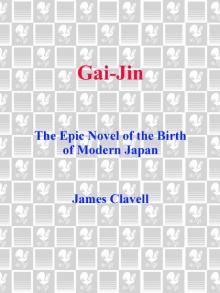 Gai-Jin
Gai-Jin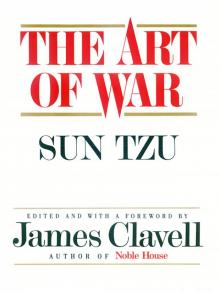 The Art of War
The Art of War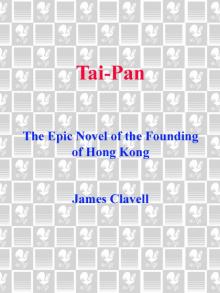 Tai-Pan
Tai-Pan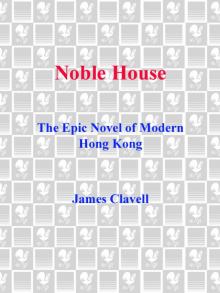 Noble House
Noble House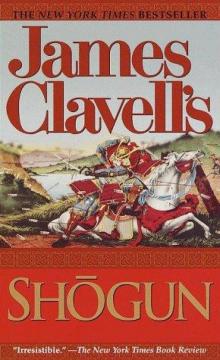 Shōgun
Shōgun Whirlwind
Whirlwind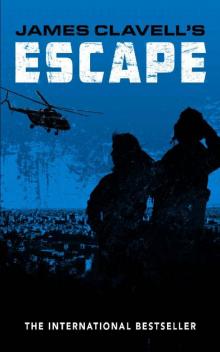 Escape
Escape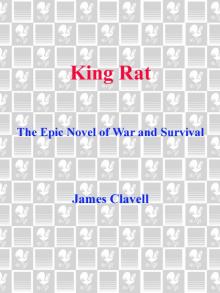 King Rat
King Rat The Children's Story
The Children's Story